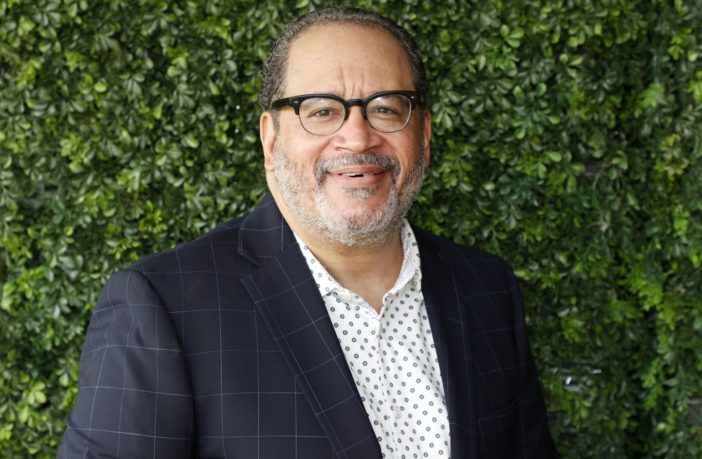Michael Eric Dyson knows hip hop. The educator, author and MSNBC correspondent broke down the four pillars of the genre during his keynote speech for Juneteenth Community Appreciation Night, held at the Cayuga Museum’s Carriage House Theater in Auburn, New York, the chosen hometown of abolitionist and activist Harriet Tubman.
“Graffiti, breakdancing, the DJ and the MC,” he declared to an enthralled crowd, which included one of the night’s honorees, Pauline Copes Johnson, the 95-year-old great, great-grandniece of Tubman. “Hip hop at its best reflects its people and the quest for knowledge through the spoken word. It’s the philosophy, the politics and the culture at its best.”
The hip hop movement started in 1973 when DJ Kool Herc began to distort beats on his first sound system: two turntables connected to two amplifiers and a Shure “Vocal Master” PA system with two speaker columns. Alongside his sister Cindy, the two threw parties for teenagers in the Bronx.
“In the beginning, the DJ was king through sound and texture and experimentation,” Dyson explained. “They said, ‘Let me cue up one song and then stop it here in the breakbeat, the break of the song.’ They came up with an art form by putting records side by side—turntablism.”
Over the decades, rappers have used their words and beats to unleash a distinctive view of their life circumstances. “Tupac Shakur was a philosophical guy. So was Biggie,” Dyson exclaimed before spitting out entire verses from Shakur’s “Point The Finga” and The Notorious B.I.G.’s “Juicy.”
While many pioneer rappers didn’t have a formal education, Dyson revealed how they were still intellects. “Jay-Z didn’t graduate from high school. Neither did Biggie,” says Dyson, who wrote Jay-Z: Made In America. “They are rhetorical geniuses. Tupac didn’t graduate but he read Shakespeare.”
In hip hop’s first two decades, rappers, mainly young Black men, were misunderstood. “They were written off or seen as stupid. But Jay-Z doesn’t write his lyrics down—those specific metaphors, the double and triple entendre, the poetic device, the enhancement—you have to be a genius to pull that off.” The only difference between Hova and classical poets who played with pentameters and lyricism? “He’s got the music,” Dyson simply said. “He’s got to bounce it off the beat, the rhythm and rhyme.”
Dyson, who also authored Holler If You Hear Me: Searching for Tupac Shakur, acknowledged that at times hip hop can be detrimental and destructive. “But at its best, it’s one of the most powerful expressions of literacy to transmit knowledge, ever.”
And, he said, it’s just great music. “Because if it can’t make you move your behind, it can’t make you move your brain,” he exclaimed. “You listen to get the beat, then you swing to it and then there’s something being said at the same time. I love it because of its ingenuity and creativity, that sparkle, vitality and power of the music to articulate in a few phrases what takes us sometimes pages to communicate.”
Products featured on EBONY are independently selected and curated by the editorial team. However, when you buy something through our retail links, EBONY may earn an affiliate commission.



